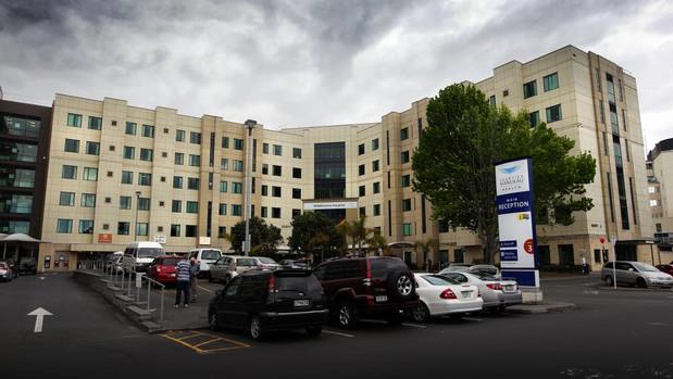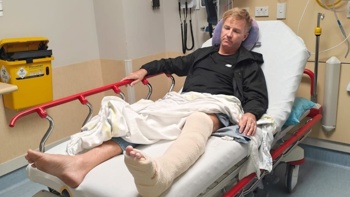
A shortage of maternity beds contributed to an accident where a woman fell and broke her leg hours after giving birth at Middlemore Hospital, a report has found.
New mum Shina Ali, 27, told the Herald on Sunday she fell and fractured her right tibia after a nurse who was caring for her made her walk before her epidural had fully worn off, despite Ali repeatedly telling the nurse her leg was still numb.
The incident, which happened during the early hours of February 19, sparked a high-level Serious Sentinel Event investigation, which requires reporting to watchdog the Health Quality and Safety Commission.
Ali said she was injured while leaving the maternity ward after midnight - six hours after her first child, a son, was born - because a nurse told her she had to go to a birthing unit because the ward was full.
She said she asked the nurse who was discharging her for a wheelchair or to help them walk to the car, but she did not make one available. The nurse disputed this.
A report by Counties Manukau DHB into the incident, which has been obtained by the Herald on Sunday, has recommended Middlemore review the number of beds in its maternity unit to provide "best-practice inpatient care for women".
The care provided to her was not in line with the DHB's guidelines for transfer of women to a birthing unit and was not best practice, the report said.
"Mrs [Ali] was inappropriately mobilised on a numb leg, she subsequently fell and fractured her tibia... This was due to competing priorities with high clinical demand in Maternity Services."
The report said the nurse felt pressured to discharge Ali as soon as possible and did not tell her superior Ali had said her leg was still numb.
Beds in the maternity ward were often full, according to the document.
The report comes after a letter to Health Minister David Clark revealed resources at Middlemore were so stretched cancers were being discovered too late and poorer patients were being overlooked.
Middlemore's clinical director of obstetrics and gynaecology Dr Sarah Tout said 536 babies were born at the hospital during February, an average of 19 per day.
The hospital has 45 maternity beds, 23 of which are for postnatal care.
From 6pm on February 18 to midnight on February 19, the period between which Ali's son was born and she was told to leave the hospital, all postnatal beds were full.
The report also found medical practitioners caring for Ali did not appropriately document her epidural assessment and ongoing numbness.
It recommended the DHB standardise the process for transferring new mums to their cars when they were discharged, including using wheelchairs when necessary, and develop guidelines for epidural care after birth. This should include a falls risk assessment.
The DHB should remind staff of the importance of documenting assessments and escalating concerns, the report said.
Tout said clinical leaders at the DHB and its Adverse Event Committee had reviewed and accepted the report's findings.
The team had produced a detailed action plan including timeframes by which each recommendation needed to be implemented. Progress would be reported and monitored until all were completed.
Ali said she was happy with how thorough the report was.
However, she also wanted the nurse involved to be held accountable.
"They should have at least given her a written warning," said Ali.
Ali's leg was in a moon boot for six weeks and she could not take her newborn baby out while she was recovering because she couldn't drive or walk.
"It was quite hard. I had a lot of family support but if that didn't happen it could have been a different situation," she said.
/arc-anglerfish-syd-prod-nzme.s3.amazonaws.com/public/J57OPXZSL5B2NHEDWXRP72HW4Q.jpg)
An x-ray showing the break in Shina Ali's tibia. (Photo / Supplied)
"I don't want other ladies to go through that."
Jenn Hooper, founder and spokeswoman of the support group for families affected by failures in maternity care Action to Improve Maternity, said the DHB had failed Ali.
"When an epidural is still in place, if there's not enough beds to even cope with that, then we're in bigger trouble because that's a very clear need.
"You should never be discharging somebody when they're still got effects of an epidural for exactly the reasons of what happened in this fall, but also what if it's not actually the epidural effect that's causing that numbness? What if it was a pinched nerve?"
She said the DHB needed to introduce stronger safeguards then guidelines to prevent a similar incident from occurring.
"They need to create a protocol, not more bloody guidelines. People ignore guidelines all the time. They need to start calling thing 'minimum standards' to stop this happening."
Take your Radio, Podcasts and Music with you









